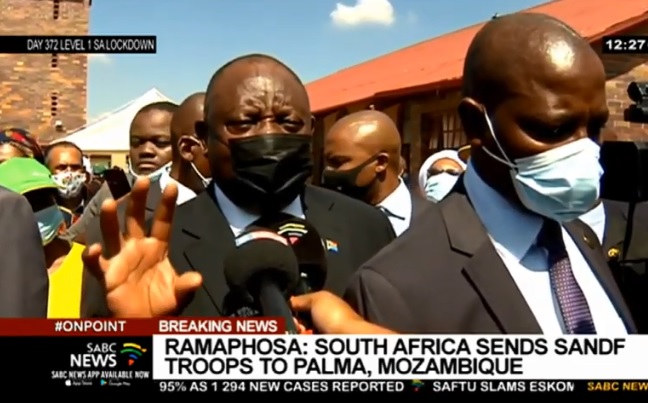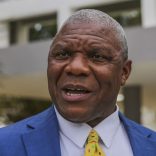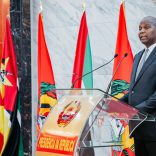Mozambique: Joint operations with Rwanda must continue, says defence minister
SANDF troops in Mozambique to evacuate South Africans – Watch

Screen grab: SABC
The South Africa National Defence Force (SANDF) has sent troops to repatriate South Africans from Mozambique.
President Cyril Ramaphosa says soldiers are in Cabo Delgado trying to evacuate citizens.
One South African has been confirmed dead following an attack on the town of Palma.
President Cyril Ramaphosa says the SANDF is working hard on securing the safety of South Africans who are stranded in Mozambique. He says the army is working on evacuating more people. The president gave the update during a wreath-laying ceremony for Ma Winnie-Madikizela-Mandela. pic.twitter.com/YFymm7Xilh
— eNCA (@eNCA) April 2, 2021
Ramaphosa said the SANDF was working hard to secure the safety of SA citizens.
“We are attending to the matter on an ongoing basis and we have already attended to the issue of evacuating those South Africans who are stranded in Mozambique… the SANDF has brought them back and we are remaining involved with securing the safety of our people in Mozambique,” he said.
Ramaphosa was speaking at a wreath-laying ceremony organised by the ANC at the gravesite of struggle stalwart Winnie Madikizela-Mandela at Fourways Memorial Park in Johannesburg.
Dozens of civilians were killed, including one South African, in Palma where a major gas project worth an estimated $60 billion (R900 billion) was being built by France’s Total and other energy companies.
Total suspended operations at the facility that is located just a dozen kilometres from Palma.
International aid agency sources said between 6,000 and 10,000 people were waiting to be evacuated to safety following the raid on Palma.
The attack forced expatriate workers and locals to seek refuge temporarily at a heavily guarded gas plant located on the Afungi peninsula — 10 kilometres from Palma, on the Indian Ocean coast south of the Tanzanian border.
‘Shot while fleeing’
The armed attackers fired on civilians in their homes and on the streets “as they tried to flee for their lives”, according to Human Rights Watch.
The violent, calculated raid broke a three-month hiatus in Islamist attacks widely attributed to counter-insurgency tactics and the rainy season from January through March.
Although the extremist fighters launched their campaign in 2017, experts say they had begun mobilising a decade earlier as disgruntled youths starting to practise a different type of Islam, drinking alcohol and entering mosques dressed in shorts and shoes.
The violence has now taken root and claimed at least 2,600 lives, half of them civilians, according to the US-based data-collecting agency Armed Conflict Location and Event Data (ACLED).
“We are extremely concerned about the impact that this new outbreak of violence is having on already very vulnerable people who have been affected by years of conflict,” said medical charity MSF.












Leave a Reply
Be the First to Comment!
You must be logged in to post a comment.
You must be logged in to post a comment.